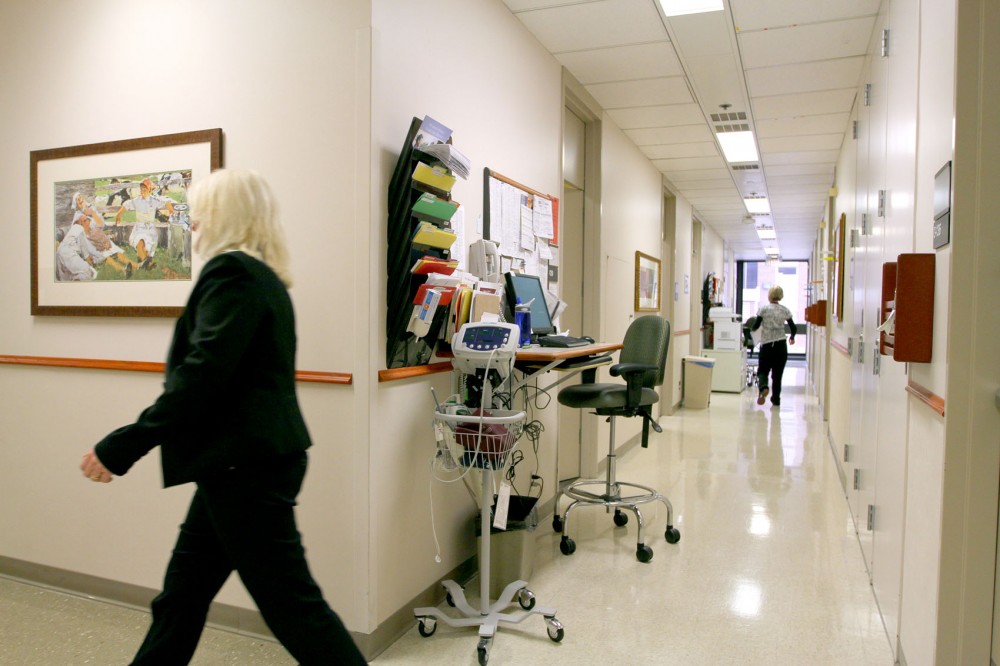The University of Minnesota’s School of Nursing is expanding mental health services to underserved parts of the state.
After receiving a $2.1 million grant from the Health Resources and Services Administration, the School of Nursing will partner with the Amherst H. Wilder Foundation, Touchstone Mental Health and Northern Pines Mental Health Center to train students and provide mental health and primary care to rural areas of the state and those with limited access.
The initiative involves training pharmacy, psychiatry and family nurse practitioner students together to breach barriers between disciplines and provide better care, said Merrie Kaas, nursing professor and project lead.
“They all get an interprofessional and integrated care experience in their particular program,” Kaas said.
Students train together and provide care at the centers for underserved populations.
“Our goal is to train, mentor and bring along the next generation of mental health professionals who hail from communities that don’t typically get mental health services because they don’t have someone who reflects their culture, language and background,” said Amy Ward, director of health initiatives at the Wilder Foundation.
Many who work with mentally ill people and their families aren’t trained to work with others who approach similar issues in a different discipline, which can lead to alienation of some patients, Ward said.
The initiative stemmed from increased awareness of a lack of mental health resources across the state and a link between poor primary care and poor mental health, Kaas said.
“When one has a mental health problem, it affects their physical health and limits their ability to reach out and get primary care services,” she said.
While services the program provides at Northern Pines’ six locations can reach a more rural population, Kaas said people in urban areas also often lack access to mental health resources and primary care — Wilder and Touchstone can help with that.
The initiative uses telehealth technology, or the use of telecommunication technologies to support long-distance clinical health care and education to promote collaboration across the three disciplines and three sites.
Kaas said telehealth technology can help provide more flexible care.
“There are a number of clients in urban environments who don’t come to a clinic for care who could be served if we were able to access them through telehealth capabilities,” Kaas said.
To sustain the initiative once grant money runs out, Touchstone will help fund the program. Additionally, Wilder and Northern Pines are two of six Minnesota Certified Community Behavioral Health Clinics, which covers service costs upfront and is then is reimbursed through Medicaid for Medicaid enrollees.
Minnesota was one of eight states in the country allowed to develop CCBHCs as a model to deliver integrated care for the mentally ill that includes basic health screenings.
40 psychiatry students participate in the program, Kaas said. About 20 pharmacy students participate, along with roughly 40 family nurse practitioner students.
“Our mission in working with all these disciplines is to bring people together so that they become attuned to working in a team environment and attuned to listening to one another and respecting one another as professionals,” Ward said.
Additionally, patients are more satisfied with the health care they get because they don’t have to repeat their stories multiple times.
“Better decisions are made when people work together,” Ward said. “Consumers of health care greatly suffer when people don’t know how to work together.”
Working across disciplines improves cultural competency of the health care providers themselves, allowing them to understand people with different professions, said Glenn Anderson of Northern Pines.
“They have to step outside of their own vision of reality and understand people with different professional cultures,” he said.
Correction: A previous version of this article misstated the number of CCBHCs in Minnesota and the number of states in the U.S. approved to develop CCBHC programs. The number in Minnesota is six; the number in the U.S. is eight. The article also mischaracterized the nature of care provided by CCBHCs and the grants the projects are eligible for. They provide basic health screenings, are not waiver-based, nor are they eligible for federal grants. Finally, Wilder has not committed funding to support the University School of Nursing’s initiative.








